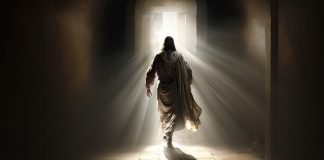What did Jesus believe about Creation?
Perhaps the greatest mystery for Christians is the incarnation of God, described in the words of the apostle John, an eyewitness to the life of Jesus: "The Word became flesh and made his dwelling among us. We have seen His glory, the glory of the only Son, who came from the Father, full of grace and truth" (John 1:14).
The testament of Jesus
We experience a feeling of urgency as a consequence of the fear of failure, or the fear of missing out (on people, opportunities, time, good things). Urgency is, therefore, a corollary of fear. Today’s Christianity, hailed by loud voices as near extinction, can easily fall into the trap of undue urgency to quickly regain what has been lost.
Is Jesus Christ the only Saviour of the world?
How can salvation be real and certain only through Jesus Christ when countless people have never even heard His name? If billions of people have no knowledge of Him, isn’t the role of Jesus Christ as the Saviour of the world exaggerated? And are there no other ways of salvation besides Him?
Suffering evil and loving your enemies
The greatest Teacher I have ever known is Jesus Christ, and one of His most profound teachings is 'Love your enemies'.
The essence of Christmas
A magical Christmas, a magical evening, magical touch, magical love – people talk about magic when they experience special emotions that they cannot or would rather not explain. "Bring a little magic into your life". This is a saying that resonates extremely well with the expectations of an entire generation.
COVID-19: Rehearsal for the big surprise
There has been a lot of speculation in the online environment about COVID-19 and the end of the world, but the connection between the two is more subtle than it first appears. It has been suggested that the pandemic is only the tip of the iceberg, that it is one of the seven last plagues of Revelation, or that it is the fourth...
Really Living
The following interview was conducted by Hope Channel Romania almost ten years ago when the guest, Pastor Don Schneider, was the president of the Adventist Church in North America. Last year, on May 23, he passed away at the age of 76. Those who follow Hope Channel remember that, for a few seasons, they were able to watch his show, Really Living. Every...
Why did Jesus have to die for us?
Taken as a whole, this question sounds like a painful cry, springing forth from the depths of the human being, in the midst of the darkness of uncertainty and doubt. This question, however, consists of multiple sub-questions. We will address these essential questions that will open our minds to the light of the teachings of Him who holds all knowledge and truth.
Jesus: Where two worlds meet
Un hombre pasa con un pan al hombro.../Otro busca en el fango huesos, cáscaras/¿Cómo escribir después del infinito?
God is love and that makes us eligible, as imperfect as we may be
We have trouble understanding and accepting the image of a loving God, as we have grown too familiar with the type of love that offers itself only when it finds in a person the qualities that make them easy to love.
The opposite of love is not hatred (part 2)
Why couldn’t God simply have forgiven sinners? Precisely because sinners cannot be forgiven until they completely understand sin, with all its far reaching consequences, or before the wages of sin are paid.
What did Jesus believe about the meaning of life?
Between 2008 and 2021, 379 people died in selfie-related accidents. Made habitual by consumerism and social media, this cult of self-promotion is part of a nefarious cycle of narcissistic stimulation and a powerful indicator of our longing for worth and, by extension, meaning.
The (un)expected Messiah
“God's viewpoint is sometimes different from ours—so different that we could not even guess at it unless He had given us a Book which tells us such things.”[1](Corrie ten Boom)
Does life have meaning, or not?
When I ponder the statement, “Life holds potential meaning under any condition, even the most miserable,” the story of an anonymous woman comes to my mind. She made a deep impression on me and taught me about two existential states: having, and being.
How can I become authentic?
"Suppose I go to the Israelites…and they ask me, ‘What is his name?' Then what shall I tell them? God said to Moses, 'I AM who I AM. This is what you are to say to the Israelites: I AM has sent me to you'" (Exodus 3:13-14).


























